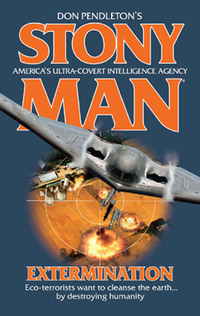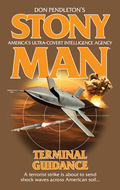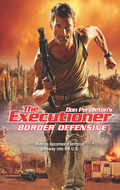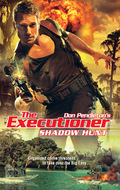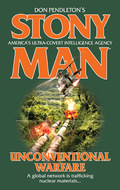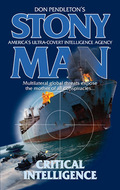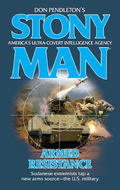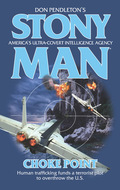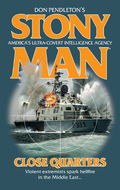Raamatut ei saa failina alla laadida, kuid seda saab lugeda meie rakenduses või veebis.
Loe raamatut: «Extermination»
“KEEP THIS QUIET OR NO PART OF YOUR NATION WILL BE SPARED THE WRATH OF GREENWAR.”
“You must bid higher than your opponent. The opening bid is one-fifth of your nation’s population. Those willing to sacrifice the most people will survive total extinction. Those willing to resist will be completely exterminated.”
Bezoar smiled, though there was no mirth or warmth in it. “Have a nice day, sir.”
The video ended.
Brognola felt as if he had to scrub himself down. He’d only been watching for ten minutes, but the horror carried the weight of hours. He set down the small smartphone, plucked out a handkerchief and mopped his brow.
“They either have someone inside Homeland Security or they have good spies. Given the aerial footage…” the President began. He rested a hand on Brognola’s shoulder. “Stony Man is our only option. Bezoar is insane, asking for me to kill one in five people.”
The smartphone beeped. The two men looked at it.
It was a text message.
“France has a bid to kill one of every two of its citizens. Make up your mind quickly.”
The Oval Office fell silent as the specter of doom hung over the big Fed and the leader of the free world.
Extermination
America’s Ultra-Cover Intelligence Agency
Stony Man®
Don Pendleton

Extermination
CONTENTS
CHAPTER ONE
CHAPTER TWO
CHAPTER THREE
CHAPTER FOUR
CHAPTER FIVE
CHAPTER SIX
CHAPTER SEVEN
CHAPTER EIGHT
CHAPTER NINE
CHAPTER TEN
CHAPTER ELEVEN
CHAPTER TWELVE
CHAPTER THIRTEEN
CHAPTER FOURTEEN
CHAPTER FIFTEEN
CHAPTER SIXTEEN
CHAPTER SEVENTEEN
CHAPTER EIGHTEEN
CHAPTER NINETEEN
CHAPTER TWENTY
CHAPTER TWENTY-ONE
CHAPTER ONE
One of the things that Trooper Eugene Robespierre liked about the state he’d sworn to protect was that all of Iowa felt like a small town. He was one of less than four hundred state troopers who saw to the safety of the roads and supplemented local law enforcement. His Ford Crown Victoria was fifty miles out of Lansing, the end of Iowa Highway 9 and this current leg of his patrol. In Lansing he’d spell himself for the night before returning to the District 10 barracks back on Oelwein. This was a once-a-month roll for Robespierre, mainly because this corner of Iowa was quiet. The road twisted and bent to find the path of least resistance between the rippling hills and strips of farmland.
“Unit 327, Unit 327, call in,” his radio chirped.
Robespierre picked up the receiver. “I’m here, Janice. What’s going on?”
“We’ve got a call from the Allamakee Sheriff’s Department about a problem in the town of Albion,” the dispatcher, Janice Clayton, told him.
“Problem?” Robespierre asked.
“It seems like there’s a riot in Albion,” Clayton said.
Robespierre had never been near Albion, a quiet little stretch of farmland that had never boasted more than six hundred souls. The town had been so peaceful, the only reason he knew anything about it was that his best friend had been born and raised there, and railed about how absolutely boring the place had been.
“Riot,” he repeated. He was already turning back to the west. The computer beside him in the squad car was already determining the best route to Albion by GPS. From what Robespierre remembered, Albion was a place where everyone was well fed. It wasn’t in the cornfields of central Iowa, but this area still had pockets of farmland between rows of trees and the rolling hills. Some were conventional crop fields, but a few orchards were sprinkled here and there. Even as he gunned the engine, racing toward Albion, he noticed that something akin to a tornado had landed by the roadside.
He stomped on the brakes, skidding to a halt beside a fruit stand that had been assaulted. Broken, half-eaten fruit was scattered everywhere, and there were bodies littered among the mushy remains. Robespierre pulled his radio.
“Dispatch, we’ve got eight casualties at roadside, by marker 12,” the trooper called. He hit the dash computer, transmitting his GPS position to the barracks.
“We’re aware of them. All were announced DOA by the local sheriffs’ deputies,” Clayton replied.
“He left the bodies out here?” Robespierre asked, sliding out from behind the wheel to get a closer look. It might have been a trick of the light, or smears of mashed fruit, but a couple of the corpses on the ground looked as if bites had been taken out of them. Another body lay just outside the carnage of twisted corpses and pulped food. The man had been wearing flannel, the front of his shirt hanging in ragged strips where it had been torn by the unmistakable violence of a twelve-gauge shotgun. Unlike some of the others lying amid the ruins and carcasses, his face was fully visible. There was no apparent reason as to why he had been shot, except for the fact that his belly was distended to the point where shirt buttons around his stomach had popped off.
“The hell?” Robespierre muttered, hoping someone was out there who could give him an answer.
“Robey, you need to get to town,” Clayton replied. “The deputies are in deep shit. They need backup now!”
Robespierre turned back, but he had seen more that was unusual among the dead.
One of them, a young woman, had apparently asphyxiated trying to swallow gulps of squash. Her belly was distended, too, recalling the images of horror from Ethiopian and Somali droughts. The woman’s mouth and cheeks were stuffed with a choking mass of pulp, her crazed eyes wide with terror.
She’d literally eaten herself to death, and Robespierre looked to see half-eaten fruit scattered in a trail leading back to Albion. “How many deputies are on scene?”
“Three of them, but they’re running out of ammunition,” Clayton answered. “I’ve also diverted more troopers, but you might want to make sure you have easy access to your rifle.”
“Running out of ammo,” Robespierre repeated. “Are they in a restaurant or a grocery store?”
“Uh…no. A delivery truck, refrigerated, for produce,” Clayton said. “How did you know the call-in was about a food riot?”
“Because I saw the damage done at a roadside fruit stand,” Robespierre told her. “I don’t get it. There’s all kinds of food around, and these people are scrambling to down so much that they choke on it?”
He’d reached the rise of a hill and looked down on the small town of Albion. Bodies were strewed in the road running through the center of town, and fires had broken out in different corners of the little burg. Robespierre looked at the Smith & Wesson Military and Police 15 rifle locked into its dashboard rack. The weapon was one of the latest M-16 clones built by various companies foreign and domestic, but the M&P was the same “brand” as the .40-caliber pistol on his hip, so the Iowa state troopers had received a deal on both sidearms and patrol rifles. Robespierre had enjoyed shooting the MP-15; it was accurate and wasn’t prone to jamming like other M-16 knockoffs, but this would be the first time he’d have to utilize it in an actual fight.
Gunfire crackled in the distance, and from the sound of things, it was more than just a few deputies firing. This was a back-and-forth gunfight; no surprise here since rural communities and guns went hand-in-hand. Almost every household had a gun rack of some sort, and more than a couple had full-size safes. But these were sporting arms, legally purchased and owned, not the stolen outlaw arms that were smuggled into cities with weapons bans that only ended up disarming law-abiding citizens. Raging gun battles just didn’t happen in small, friendly communities where everyone had jobs and the means to support themselves.
But now, that had all changed, Robespierre realized. People were starving so badly that they risked shotgun blasts or gorged until their throats swelled and suffocated themselves. Now they were taking any means necessary to find a way to fill their starving gullets. That meant that someone between them and their food would have to die. Hunting rifles and shotguns might have been far too much for handgun-equipped deputies to deal with, unless starvation had been severely detrimental to their marksmanship.
Robespierre didn’t know what to expect, but he saw the refrigerated truck, bodies sprawled around in a battlefield of pure carnage. His Zeiss binoculars were sharp enough to give him a crystal clear view of the siege. Sweeping the scene, he saw one of the county deputy cars peppered with bullet holes. The fender hung off it like fluttering, ragged wallpaper, it had been blasted so ferociously. Deer-hunter rifles and 12-gauge buckshot were devastating against body armor, and even the fiberglass and metal of a squad car could be weakened so drastically with perforations that it fluttered like a tattered flag.
“Clayton, can you put me through to the deputies?” Robespierre asked as he adjusted the collapsible stock on his MP-15. His rifle was sighted in for point-blank at 100 yards, but the distance he looked at now was closer to 250. Immediately, he recalled his training class. The M-16’s classic 5.56 mm NATO round was lighter and much flatter shooting than the rifles Robespierre had grown up with. He’d have to trust the micrometer flip-up sights to not undershoot at the gunmen harrying his fellow lawmen. While he’d heard that abbreviated M-16s in the Gulf and Afghanistan had proved to be less than fully effective at long distances, the Iowa DPS had assured him that those failures were with rifles with barrels two inches shorter, and utilizing standard military ball ammunition. None of the alleged shortcomings were apparent in the hands of marksmen who placed their shots well.
“You’re hooked up now, Robey,” Clayton said over the radio.
“How many troopers we have here?” a deputy asked.
“Just one,” Robespierre said. “But backup’s on the way. What’s the situation down there?”
“I’ve got one officer down and bleeding badly,” came the response. “And there’s six crazies with guns still active around us. I’m on my last five shots.”
Robespierre hoped that his sights were tuned correctly as he pulled the trigger on the MP-15, spitting a single projectile out of the barrel. The 5.56 mm bullet struck the metal of a railing 250 yards away, sparks flying and causing one of the food-caked gunmen only inches from the point of impact to flinch, rifle slipping from his hands. Robespierre’s heart hammered as he realized that he’d taken a shot at another human being. As a lawman, his job was to save and protect lives, not take them, and shooting someone in the back was something he hadn’t anticipated.
This wasn’t a wild canine stalking a chicken coop or an injured farm animal that had been mortally wounded by a car; this was a fellow American citizen. Robespierre pulled the trigger again, nerves getting to him as his finger jerked hard, pulling the weapon off target. The second shot made another of the marauding riflemen stumble, and he realized that it was a teenage boy, his face smeared with crusted food. His shirt buttons had popped around his belly, exposing livid red welts where the skin and tissue had split from where his belly had expanded. The kid collapsed to the ground with enough force that his overstretched stomach burst, coils of stuffed intestine rolling out of splits in the skin.
Robespierre recoiled mentally from the horror of what had happened to the kid he’d just shot.
“Christ, not another popper,” the deputy groaned.
“Another?” Robespierre asked.
“These guys are crammed full of shit that’s been sitting in their guts for days. None of it’s digested,” the deputy explained. “Look out, they’re heading up toward you.”
“Then get out of there,” Robespierre said. “I’ve got their attention.”
“You can handle this?” the deputy asked.
Robespierre tried to tame the butterflies that whirled in his stomach, but managed the strength to lie. “I got this.”
The windshield of his Crown Vic suddenly violently shuddered, a fist-size hole punched through it. One of the remaining gunmen had cut loose with his bolt-action rifle, a powerful .30-caliber deer-hunting round easily penetrating the squad-car-quality safety glass. Another bullet made a loud crunch against the grille of the car, steam suddenly spitting out of the cracks between the hood and the fenders. Robespierre, even crouched behind the door of his car, had to recoil from the sudden wave of heat blowing over him. Other guns boomed downrange, but nothing came close. They were either pistol-caliber carbines or they were shotguns, unable to reach all the way up to the squad car.
It was a small consolation. Robespierre was half blinded by steam and he was in no mood to go up against a group of people who might as well have just been more victims than madmen.
Suddenly, the world seemed to go silent around Robespierre. A weight built up in the trooper’s chest, an oppressive force that seemed to crush his ribs and threatened to burst his lungs and heart. He glanced down at his chest and saw that his uniform blouse was darkening, growing slick against his chest. The squad car’s door had smoke curling through a hole that hadn’t been there before and Robespierre toppled helplessly away from the squad car, gasping and trying to fill his lungs.
He’d worn his vest, but the bullet, after cutting through sheet metal and the car’s interior wall, had gone through his side, only clipping the edge of his Kevlar. The overwhelming trauma of the impact was not an indication of the lethality of the hit, thankfully. The 30-caliber slug had shattered a rib and entered Robespierre’s thoracic cavity, but it had miraculously avoided brachial arteries, coming to a stop as it deformed against the man’s shoulder blade. With the scapula and rib broken, Robespierre felt as if he were being crushed by a python. The effects would be lethal if the internal bleeding wasn’t stopped.
He wasn’t dead, though his mind was completely out of the fight. He’d taken the hit, and like most human beings, he equated severe injury from a gunshot wound with the end. Finally, he sucked in a breath, and it felt like heaven, his senses starting to clear.
Blurry-eyed, he rolled his head, looking under the car door. There was movement downhill, and through the fog between his ears, he could finally hear the chatter of gunfire. He wanted to speak up, to continue shooting and fighting back, helping the deputies on hand.
“Get up,” he croaked to himself, reaching out to the door handle for leverage. “Your brothers need help.”
With that and the strength of his uninjured left arm, Robespierre was able to haul himself off the asphalt, the car door creaking under the unnatural pressure put upon it by the wounded trooper.
“Statie? You still alive up there?” came a call over his radio.
“I’ll have…back…you…that,” Robespierre grunted out loud, each breath feeling like a dagger plunged into the right side of his chest. He could have sworn he’d sounded more eloquent, less bestial, when he was trying to revive himself. “You?”
“We’re fine,” the deputy replied. “You distracted them enough for us to put the last of the crazies down.”
Robespierre rested his head against the padding under the window of his car door. “Got hit.”
“Damn, why didn’t you say something?”
“No chance,” Robespierre replied. He could already hear Clayton’s excited voice over the patrol car’s dash radio, calling for medical assistance.
“Be fine,” Robespierre added, hanging on for dear life. He wasn’t having trouble breathing now, but he was starting to feel light-headed. The blood was dark, nonarterial, which was good news. If it was an artery, his chances of survival would be lessened considerably. Veinous and capillary blood wasn’t what fed his body the vital reserves of oxygen it needed to keep going, though eventually blood loss was going to become a life-threatening factor. Most of his incapacitation was due to the nearly paralyzing pain of broken bones.
The deputies were fairly distant, but they were making good time racing up the incline toward his car. Robespierre also heard the distant whir of a propeller growing louder, cutting through the ringing in his ears from the brief gun battle he engaged in. Even outside, the MP-15 patrol rifle put out a considerable wave of pressure and sound that had funneled into the interior of the squad car and rebounded, making his right ear full of a pealing whine set to drive him nuts.
He turned his attention toward the approaching aircraft, wondering if the Iowa State Police had dispatched a helicopter. Robespierre didn’t think it could happen this quickly, but he was glad for the arrival. The faster he got to a hospital, the faster his bleeding and broken bones could be taken care of.
He didn’t see a helicopter, nor even a Cessna-style prop plane. The approaching craft looked akin to a torpedo with long, slender wings.
“’Zat?” Robespierre asked Clayton, slurring “what’s that” into a single utterance.
“You have something in the air by you?” Clayton returned. “Nothing has been dispatched.”
Through the fog of his traumatized mind, Robespierre recognized the odd object as it crawled slowly closer to him like a white, ramrod-straight maggot. He’d seen it on TV on a show about military weapons hosted by a bald guy who whispered dramatically to the point where he seemed more like a caricature than a soldier.
Global Hawk, the name came in a breathless, hushed tone pulled from the show. The wings seemed wrong, with cylinders nestled up beneath its pale belly.
This Hawk, came the host’s voice again, has talons.
“No…it couldn’t be,” Robespierre said to himself, his internal dialogue indeed clearer.
“Robey?” Clayton called over the radio. “What did you croak about?”
“Global Hawk,” Robespierre repeated, putting every ounce of strength into getting the name right.
“What?”
The unmanned drone soared over the squad car, and as it did so, two of the cylinders detached from the wing points. Robespierre tapped his sagging reserves of energy once again, hauling himself behind the dashboard of the car as he saw them release.
“Cover!” he bellowed into his radio.
He wondered if the warning was in time, then he heard a loud, powerful thump in the distance. The windshield suddenly cracked as if struck with a sledgehammer, the glass turning white with fractures as the flexible polymer core sandwiched between the panes did its job, preventing razor-sharp shards from flying into the interior of the car. The squad car, being a hundred feet from the blast center, had absorbed the wave of three pounds per square inch of increased air pressure, the roll cage and safety glass absorbing the shock wave that proved powerful enough to fold the metal struts holding up traffic signs.
Robespierre remained safe and conscious for the fifteen minutes it took for backup and an ambulance to arrive at the quiet town of Albion. What the trooper hadn’t noticed, thanks to the impact of a rifle bullet into his thoracic cavity, was a prior explosion at the fruit stand he’d paused at, where he’d seen the remnants of people who ate until their throats clogged or were maddened enough by hunger to charge a man holding a shotgun. The previous blast had turned the roadside attraction and the corpses around it into vapor, the combined force of two 500-pound laser-guided bombs more than sufficient to produce a thirty-meter-wide crater where any body parts found would have been made of ash or crumpled, blast-shattered bone.
The town had been rocked by more than just two of the canisters. Robespierre had been shell-shocked for the devastating explosion, missing the other two bombs that had been part of the MQ-9 Reaper’s 3800-pound payload. The MQ-9 was far different from the jet-engine-powered Global Hawk RQ-4, precisely for the propeller wash that had convinced the trooper that an aircraft had been approaching. Its six 500-pound dumb bombs had been more than enough to turn Albion into a smoldering crater—actually, two huge butterfly-shaped craters easily thirty meters wide. Even though Iowa was in the dreaded tornado alley of the central United States, the construction of the town hadn’t been sturdy enough to deal with the overpressure that flattened brick walls and turned wood to splinters.
Only Robespierre’s distance from ground zero, and the bloody mess he’d been reduced to, had spared him as the Reaper’s operator assumed he was likely mortally wounded. Had the trooper shown more signs of life than sagging against a car door, the drone’s operator would have used one of the wing-mounted AGM Hellfire missiles on the squad car, turning it into a mass of twisted wreckage.
It was a bit of overconfidence and laziness on the drone crew’s part. Not only did there exist a living witness to the carnage of Albion, but there was also dash-camera footage of a renegade, heavily armed unmanned aerial vehicle blowing a town on American soil to oblivion.
THE RINGING of a phone jarred Hermann “Gadgets” Schwarz from his sleep, and his head popped up from the pillow. In the dark hotel room’s other bed, Schwarz’s best friend, Rosario “Politician” Blancanales, continued to snore. According to the luminous dial on Schwarz’s watch, it was a little after five in the afternoon.
Able Team, a three-man counterterrorism and anti-crime squad, had been hunting leads from the shadows of evening past the crack of dawn.
This particular hunt had brought them to Chicago, and the search was on for the steering and laser guidance models that would turn a gravity-flung conventional bomb into a precision strike munition. Such a device—let alone a large shipment—in the hands of the wrong people would result in large death tolls. One well-placed warhead, even of the 250-pound variety, would be able to collapse a skyscraper in on itself as if it were made of precariously balanced playing cards. A crowded office building or a federal building would go from bustling workplace for thousands of people to a tomb for those teeming multitudes.
Schwarz let the phone stop ringing and pulled out his personal Combat PDA. The screen blipped to life, and Barbara Price was on the other end.
“What’s going on?” Schwarz asked.
“We found a few of the laser guidance modules,” Price said, her voice grim and eyes unwavering from the webcam she looked into. “Northeastern Iowa, near the Illinois border.”
“How many killed?” Schwarz asked.
That bit of conversation prompted Blancanales to sit up, fully awake, turning on the bedside lamp. Schwarz grimaced at the pile of pizza boxes and junk food bags overflowing from the room’s tiny garbage pail.
Though Blancanales’s hair was whitened with age, his weathered face lined with wrinkles, the man’s back and shoulders were tautly muscled, ropy coils of sinew flowing as he threw on his shoulder holster and then tugged on a sport shirt to conceal the carry rig.
“We can’t tell. Official reports put the population of Albion at 250, but there’s no finding most of their bodies,” Price said. “But we have an eyewitness and dash-cam footage. Hal’s doing everything to keep this squashed in the press, so you guys better get out there.”
Schwarz nodded for his CPDA’s webcam. “Something else is wrong?”
“The survivor and radio dispatch are telling us stories of strange activity before the bombs hit,” Price answered. “Very strange activity that makes the laser-guided bombs now a secondary concern.”
Schwarz frowned. “We’ll head to the airport and have Mott take us in.”
The CPDA connection clicked off, and Schwarz looked to his old buddy.
“Worse than laser-guided bombs?” Blancanales asked. “This is going to be another bad one.”
“I took the call. You go wake Carl,” Schwarz told him.
Blancanales, already dressed, nodded and acceded to his friend’s request. Schwarz took the opportunity to get his gear prepared for the trip. There was a knock at the room door much quicker than he would have expected.
Schwarz kept his pistol hidden behind his leg, just in case there was trouble. It was Blancanales again.
“You didn’t get Carl?” Schwarz asked.
Blancanales held up a note. “He taped this to our door.”
Schwarz unfolded it. “‘Picking up a loose end,’” he read out loud.
Blancanales nodded. “We’ll find him quick enough if we follow the sounds of the explosions.”
Schwarz sighed. “I’ll call Mott and have him wait for us while we rein in the Ironman.”
“If I know him, he’s been out all day,” Blancanales replied. “He might just be done already.”
Tasuta katkend on lõppenud.
